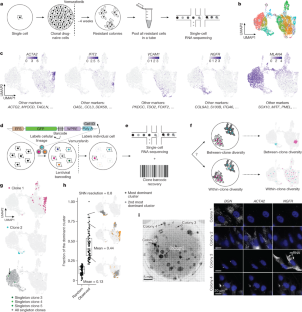科学者らは、がん細胞が治療に対してどのように反応するかについて他の研究者に情報を提供する「QRコード」を開発した。 Scientists develop a “QR code” to provide other researchers information about how cancer cells react to treatment
2023-07-19 ノースウェスタン大学
◆この研究により、治療開始前から現れる微細な違いががん細胞の行動を決定しており、遺伝子ではないことが明らかになりました。これにより、治療抵抗性の原因をターゲットにした新たな治療法の開発が可能となります。将来的にはさまざまな治療法とがん種で細胞の行動を予測できるかどうかを調査する予定です。
◆この研究成果は、がんだけでなく、胚の発育や再生医療など、さまざまな生物学的問題にも適用できる可能性があります。
<関連情報>
- https://news.northwestern.edu/stories/2023/07/tumor-cell-resistance/
- https://www.nature.com/articles/s41586-023-06342-8
均質ながん細胞を薬物治療すると、多様なクローン運命が現れる Diverse clonal fates emerge upon drug treatment of homogeneous cancer cells
Yogesh Goyal,Gianna T. Busch,Maalavika Pillai,Jingxin Li,Ryan H. Boe,Emanuelle I. Grody,Manoj Chelvanambi,Ian P. Dardani,Benjamin Emert,Nicholas Bodkin,Jonas Braun,Dylan Fingerman,Amanpreet Kaur,Naveen Jain,Pavithran T. Ravindran,Ian A. Mellis,Karun Kiani,Gretchen M. Alicea,Mitchell E. Fane,Syeda Subia Ahmed,Haiyin Li,Yeqing Chen,Cedric Chai,Jessica Kaster,Russell G. Witt,Rossana Lazcano,Davis R. Ingram,Sarah B. Johnson,Khalida Wani,Margaret C. Dunagin,Alexander J. Lazar,Ashani T. Weeraratna,Jennifer A. Wargo,Meenhard Herlyn & Arjun Raj
Nature Published19: July 2023
DOI:https://doi.org/10.1038/s41586-023-06342-8

Abstract
Even among genetically identical cancer cells, resistance to therapy frequently emerges from a small subset of those cells1,2,3,4,5,6,7. Molecular differences in rare individual cells in the initial population enable certain cells to become resistant to therapy7,8,9; however, comparatively little is known about the variability in the resistance outcomes. Here we develop and apply FateMap, a framework that combines DNA barcoding with single-cell RNA sequencing, to reveal the fates of hundreds of thousands of clones exposed to anti-cancer therapies. We show that resistant clones emerging from single-cell-derived cancer cells adopt molecularly, morphologically and functionally distinct resistant types. These resistant types are largely predetermined by molecular differences between cells before drug addition and not by extrinsic factors. Changes in the dose and type of drug can switch the resistant type of an initial cell, resulting in the generation and elimination of certain resistant types. Samples from patients show evidence for the existence of these resistant types in a clinical context. We observed diversity in resistant types across several single-cell-derived cancer cell lines and cell types treated with a variety of drugs. The diversity of resistant types as a result of the variability in intrinsic cell states may be a generic feature of responses to external cues.


